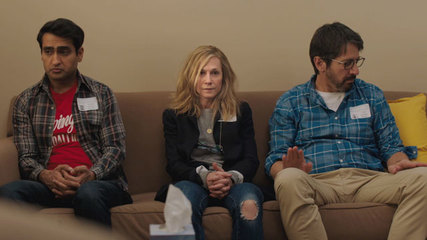A- | A Pakistani-American comedian juggles his conservative family and his white girlfriend's family when she slips into a coma. Directed by Michael Showalter Starring Kumail Nanjiani, Zoe Kazan, Ray Romano, and Holly Hunter Initial Review by Jon Kissel |

If Showalter and Apatow are steering the ship, Kumail and Emily have impeccably constructed it. I tend to give directors primary credit for films, but The Big Sick belongs to the writers. It’s apparent in the fairness given to Kumail’s Pakistani parents, in the emotional intelligence given to Emily’s character, in the way that Kumail vents his frustration at unrelated strangers and then immediately backtracks. This is a film that treats even its ancillary characters like recognizable people, a credit to how intricately Kumail and Emily thought about their script. It would’ve been easy for them to focus exclusively on their own lives, but they have the foresight to sculpt the world around them with just as much care and attention.
These kinds of small, conversational films live in the writing, but also in the performances. The script might be The Big Sick’s number one asset, but the performances are close behind. This is where Showalter reasserts himself as owner of the film, as after Hello, My Name is Doris, he’s making a mark for himself as a director who makes comedies featuring powerful acting. This is most true in relation to Ray Romano and Holly Hunter, who play Emily’s parents. Romano’s Terry is a figure of good-natured fun, satisfied with being the butt of jokes if it makes the people around him laugh. In forgetting that he’s bad at telling jokes and then immediately remembering after telling one, he suddenly becomes the best comedian in a film full of them. He’s also painfully honest, in sharp relief to Kumail who’s lying to everyone. Romano plays him as decent to the core, and makes that characterization easily believable. Hunter plays the more fiery parent, and she steals the film. Her Beth is the mom of moms, turning into a wolverine when it’s called for. She goes so far as to walk literal circles around anyone she perceives as doing harm to or withholding something from her daughter. When Kumail is able to win her over, it’s thanks to Hunter that this feels like such a monumental accomplishment.
Romano and Hunter are the winning performers, though they have plenty of competition. Zoe Kazan plays a wholly recognizable Emily, or at least the Emily who showed up on The Indoor Kids. Kumail’s parents, played by Anupam Kher and Zenobia Shroff, have to be lovable enough that something is at stake if he disappoints them, and both achieve that state. Vella Lovell has a small but resonant part as one of Kumail’s potential suitors, and the comedy quintet that Kumail mixes with feels like a believable group of friendly competitors. Kurt Braunohler as the least-successful of them is especially hilarious, a well-calibrated character far down the call sheet. The weak link might be Kumail himself, who has no problem on stage or telling great 9/11 jokes, but who I think struggles with the more dramatic scenes. He’s not bad, but he’s being outclassed by the old pros around him.
We’re talking about The Big Sick because of its status as a culture clash film, and I’d be remiss if I didn’t bring that up. Here, there’s very little clash within Kumail himself. He’s fully American, except for his skin color and accent. He suffers from prejudice, but he has long ago figured out to take the repeated accusations of being a terrorist with good humor, because to do otherwise would cause him to live in a low-level state of rage. The clash is between the life his parents want him to lead and the life he wants for himself. The Big Sick takes great care to make the parents wrong, but knowable. They’ve lost so much control over their lives in immigrating here, but they still want to retain control over the picture of their future that they hold in their heads. That future is of a Pakistani and Muslim family, through and through, but in a safer and more comfortable place. However, joining America means participating in America, and there’s too much diversity here to be completely cloistered in whatever enclave one would like to live in. That goes for white people, with a popular film like The Big Sick, and for immigrant minorities, too.
I could only have loved this film based on my affection for Kumail and Emily, but The Big Sick makes it easy for anyone unfamiliar with their dynamic to get on board. This is an elaborate way for a couple to tell the world how they met, but there’s enough going on to make that a story worth telling. A-
 RSS Feed
RSS Feed